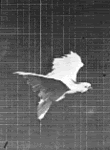
Sometimes here in Virginia at sunset
low clouds on the southern or northern horizon are completely invisible in the lighted sky.
I only know one is there because I can see its reflection in still water.
The first time I discovered this mystery I looked from cloud to no-cloud in bewilderment,
checking my bearings over and over,
thinking maybe the ark of the covenant was just passing by south of Dead Man Mountain.
Only much later did I read the explanation:
polarized light from the sky is very much weakened by reflection,
but the light in clouds isn't polarized.
So invisible clouds pass among visible clouds,
till all slide over the mountains;
so
a greater light extinguishes a lesser
as though it didn't exist.
In the great meteor shower of August, the Perseid,
I wail all day for the shooting stars I miss.
They're out there showering down, committing hara-kiri in a flame of fatal attraction,
and hissing perhaps at last into the ocean.
But at dawn what looks like a blue dome clamps down over me like a lid on a pot.
The stars and planets could smash and I'd never know.
Only a piece of ashen moon occasionally climbs up or down the inside of the dome,
and our local star without surcease explodes on our heads.
We have really only that one light, one source for all power,
and yet we must turn away from it by universal decree.
Nobody here on the planet seems aware of this strange, powerful taboo,
that we all walk about carefully averting our faces,
this way and that, lest our eyes be blasted forever.
Darkness appalls and light dazzles;
the scrap of visible light that doesn't hurt my eyes hurts my brain.
What I see sets me swaying…
…Peeping through my keyhole
I see within the range of only about thirty percent of the light that comes from the sun;
the rest is infrared and some little ultraviolet,
perfectly apparent to many animals, but invisible to me.
A nightmare network of ganglia charged and firing without my knowledge
cuts and splices what I do see, editing it for my brain.
Donald E. Carr points out
that the sense impressions of one-celled animals are not edited for the brain:
"This is philosophically interesting in a rather mournful way,
since it means
that only the
simplest animals
perceive the universe as it [really] is."
- from "On Seeing" in Pilgrim at Tinker Creek by Annie Dillard -
low clouds on the southern or northern horizon are completely invisible in the lighted sky.
I only know one is there because I can see its reflection in still water.
The first time I discovered this mystery I looked from cloud to no-cloud in bewilderment,
checking my bearings over and over,
thinking maybe the ark of the covenant was just passing by south of Dead Man Mountain.
Only much later did I read the explanation:
polarized light from the sky is very much weakened by reflection,
but the light in clouds isn't polarized.
So invisible clouds pass among visible clouds,
till all slide over the mountains;
so
a greater light extinguishes a lesser
as though it didn't exist.
In the great meteor shower of August, the Perseid,
I wail all day for the shooting stars I miss.
They're out there showering down, committing hara-kiri in a flame of fatal attraction,
and hissing perhaps at last into the ocean.
But at dawn what looks like a blue dome clamps down over me like a lid on a pot.
The stars and planets could smash and I'd never know.
Only a piece of ashen moon occasionally climbs up or down the inside of the dome,
and our local star without surcease explodes on our heads.
We have really only that one light, one source for all power,
and yet we must turn away from it by universal decree.
Nobody here on the planet seems aware of this strange, powerful taboo,
that we all walk about carefully averting our faces,
this way and that, lest our eyes be blasted forever.
Darkness appalls and light dazzles;
the scrap of visible light that doesn't hurt my eyes hurts my brain.
What I see sets me swaying…
…Peeping through my keyhole
I see within the range of only about thirty percent of the light that comes from the sun;
the rest is infrared and some little ultraviolet,
perfectly apparent to many animals, but invisible to me.
A nightmare network of ganglia charged and firing without my knowledge
cuts and splices what I do see, editing it for my brain.
Donald E. Carr points out
that the sense impressions of one-celled animals are not edited for the brain:
"This is philosophically interesting in a rather mournful way,
since it means
that only the
simplest animals
perceive the universe as it [really] is."
- from "On Seeing" in Pilgrim at Tinker Creek by Annie Dillard -

























